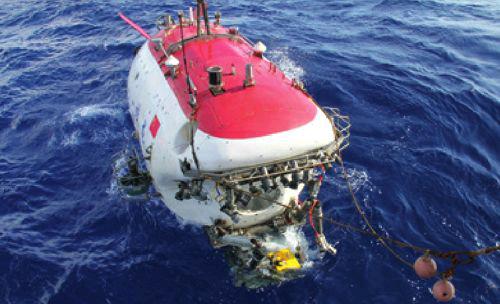Deep Dive
2014-08-27
Chinas manned submersible Jiaolong gets ready to dive into the sea for scientific research on July 16. Jiaolong and its support ship, the Xiangyanghong 09, are exploring the northwest Pacific Ocean to research cobalt-rich portions of Earths crust as well as life forms living at the bottom of the sea.
Judicial Reform
Shanghai, Chinas main financial hub, initiated a pilot judicial reform program on July 13 to make judges more accountable while also curbing government intervention in court.
Pioneering Chinas judicial reform, the program will improve management and job security for judicial staff, increase the accountability of judges and unify the personnel and finance management of local courts, according to an office in charge of the reform.
In an effort to improve professionalism, a clear division will be set between judges and procurators, other judicial staff, and administrative personnel, who will be placed under separate management, according to the reform plan.
The reform also targets the decision-making power of the judicial council, limiting its use in complicated cases on which the collegial panel shows major splits.
The plan also requires the judges and procurators at district- or county-level courts to be nominated by provincial-level judicial authority. Funds of local courts will also come from the provincial, rather than the local finance.
China has been pushing for deeper judicial reform to address public complaints over issues regarding the impartiality and competence of courts.
On July 9, the Supreme Peoples Court published a guideline for judicial reform over the next five years. The guideline includes 45 major measures across eight key judicial issues such as personnel management as well as finances and judicial selection, most of which are included in the Shanghai reform plan.
HK Election Method
Chinas top legislature has received a report from Leung Chun-ying, Chief Executive of Hong Kong Special Administrative Region (HKSAR), on possible revisions of how the regions chief executive and local legislature will be elected in the future, it was announced on July 15.
Under the Basic Law of the HKSAR, the Standing Committee of the National Peoples Congress (NPC) has final say on whether to revise the election methods of the HKSARs chief executive in 2017 and its Legislative Council in 2016, a statement from the NPC Standing Committee read.
The report from Leung is based on the results of a public consultation by the HKSAR Government from December 4 last year to May 3, the statement said.
The NPC Standing Committee will make the decision according to law, it added.
The current chief executive was elected by an election committee in 2012. Hong Kong plans to introduce universal suffrage in the election in 2017.
Pollution Fine
Ten thermal power plants across China had been fined for attempting to evade supervision of their sulphur emissions, said the National Development and Reform Commission (NDRC) on July 15.
Penalties totaling 519 million yuan($83.66 million) were handed down after investigations into the operation of sulfur-removal devices in coal-fired plants, according to the NDRC.
The commission said that some thermal plants were found to have deliberately shut down their sulfurremoval devices to reduce costs or avoid pollution monitoring.
To try to bring air pollution under control, China encourages coal-fired power generators to install devices to remove sulfur and other pollutants. Plants equipped with such devices receive government subsidies and are allowed to sell their electricity at higher prices.
Among those punished, Yangcheng International Power Generation, a Shanxi-based Sino-U.S. joint venture, faced subsidy cuts or fines to the tune of 125.6 million yuan ($20.25 million).
Fake IDs
Chinas police forces found 271,000 fake or duplicate ID records in the first
half, all of which have been nullified, the Ministry of Public Security announced on July 12.
A total of 149 cases of counterfeiting and selling fake ID cards or household registration documents have been solved and 46 members of police officers have been punished for their involvement, the ministry said in a statement.
Last year, China found and nullified 790,000 fake IDs. By the end of this year, a system to check ID information through image-matching technology will be set up across the country, according to the ministry.
Changing Wheels
On July 16, Chinas central authorities released a guideline to reform the supply and use of government vehicles in an effort to cut spending.
China will stop giving vehicles for use in regular government affairs, while keeping those for special services such as law enforcement and emergencies, according to the guideline.
The Central Government will instead allocate a “proper amount” in subsidies to public servants to allow them to choose their own means of transportation.
